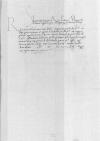List #5688
Sigismund I Jagiellon do Ioannes DANTISCUSCracow, 1537-04-24
| odebrano [1537]-05-07 Rękopiśmienne podstawy źródłowe:
| ||||
Tekst + aparat krytyczny + komentarzZwykły tekstTekst + komentarzTekst + aparat krytyczny
Reverendo in Christo Patri, domino
Reverende in Christo Pater ms. Patri(!) ⌈PaterPater ms. Patri(!) ⌉, sincere nobis dilecte.
Unguentum, quod nobis Paternitas Vestra misit, grate accepimus
et agimus ac habeamus pro illo Paternitati Vestrae magnas gratias. Quod licet prius a reverendissimo domino
Quae bene ac feliciter valeat.
Dat(ae) or Dat(um)⌈Dat(ae)Dat(ae) or Dat(um)⌉


 BNW, BOZ, 953, f. 155v
BNW, BOZ, 953, f. 155v